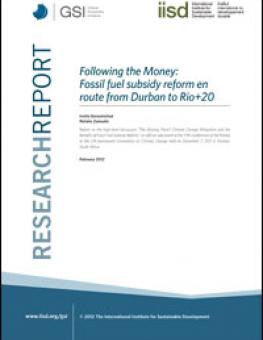
Following the Money: Fossil fuel subsidy reform en route from Durban to Rio+20
The paper summarizes the key messages of the high-level discussion "The Missing Piece? Fossil fuel subsidy reform and climate change," an official side event of UNFCCC COP17 in Durban.
The event was organized by Friends of Fossil Fuel Subsidy Reform and IISD's Global Subsidies Initiative on December 7, 2011 and brought together responsible ministers and other high-level government representatives from Costa Rica, Denmark, Ethiopia, New Zealand, Norway, Sweden and Switzerland as well as energy subsidy experts from all over the world. The discussion focused on the current state and future possible pathways of global fossil fuel subsidy reform, including opportunities for integrating the reform with national and international climate change-related policies.
Participating experts
You might also be interested in
The Cost of Fossil Fuel Reliance
Government support for fossil fuels reached at least USD 1.5 trillion in 2023, new data shows.
Increased Support Needed to Achieve India's Clean Energy Goals
India is on track to achieve many of its 2030 clean energy goals but needs to step up government support measures to accelerate the deployment of offshore wind, electric vehicles, and green hydrogen, according to a new report.
Ending Export Credits for Oil and Gas: How OECD countries can end 2024 with a climate win
For a year now, Organisation of Petroleum Exporting Countries (OECD) governments have been negotiating an agreement that could put an end to oil and gas export finance. Following the acrimony in Baku, this would be a very real way for the OECD to show policy coherence, respond to calls from the poorest countries to stop subsidizing fossil fuels, and shift public finance to solutions.
Fossil Fuel Production, Renewable Energy, and Subsidy Reform in Nationally Determined Contributions 3.0
This policy brief provides an analysis of the critical benchmarks and recommendations necessary for aligning nationally determined contributions (NDCs) with the 1.5 °C target.